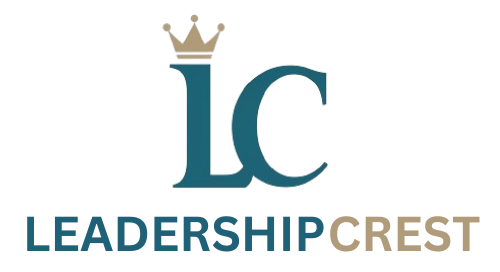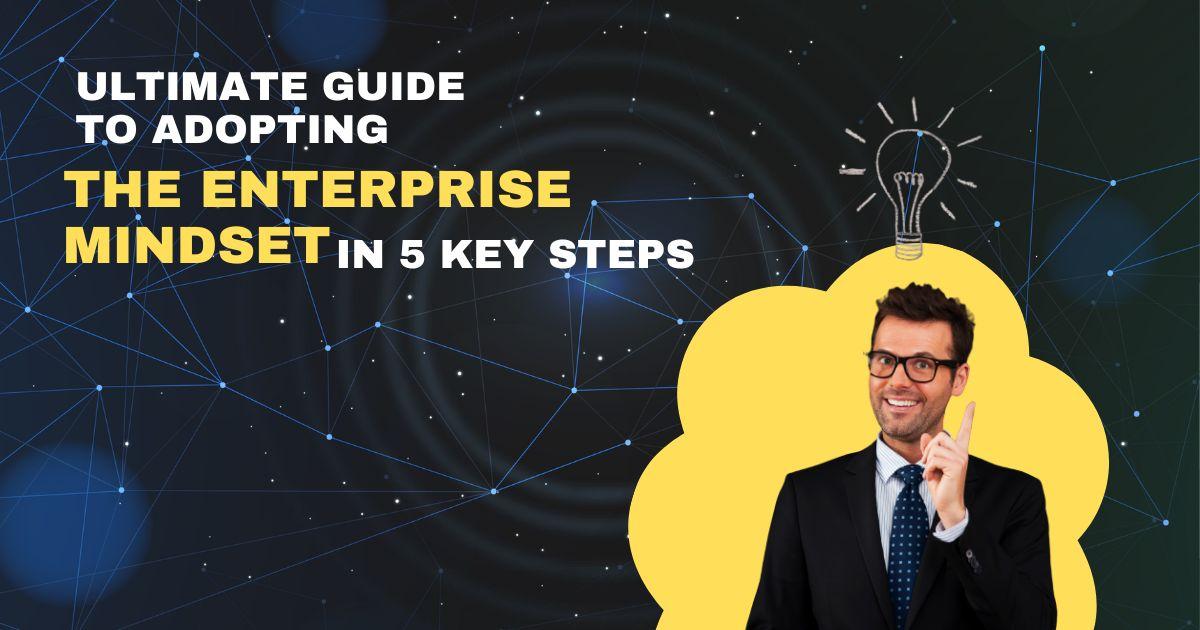Enterprise mindset is a macro-level approach benefitting an organization as a whole much beyond the departmental limitations and not specific to any role or responsibilities, can be adopted by individuals across levels, from frontline employees at the bottom of the pyramid to top executives in leadership roles.
A thorough understanding of one’s businesses and functions is a pre-requisite in today’s dynamic world where customer expectations have exponentially risen for any enterprise. To foster a culture of customer delight, an entrepreneurial mindset for its employees is a necessity for any organization striving to transform from good to greatness and make its business sustainable.
Enterprise Mindset Definition
The mindset required for the implementation of a management process enables each employee to harness and reach their full potential, helping the company succeed through participating in management and collective work.
Table of Contents
Behaviors that support an Enterprise Mindset
Long-term: Thinking a long-term vision of one’s thought process aligned with the company’s goals is required. A broader strategy with a contribution to the overall success of the company would be sustainable.
Synergy and Collaborations: Seek out new chances for growth and development across divisions on a regular basis by aggressively seeking advice, ideas, and opportunities from colleagues in other departments. This communication aids in the effective breakdown of silos, encouraging an open and cooperative culture.
Learning continuously and adapting: Learning, unlearning, and relearning relevant concepts must be adopted for continuous improvement and are part of any enterprise mindset. Individuals are open to learning from failures and are agile in adapting to evolving business landscapes.
Innovation and Creativity: Innovation is the new buzzword. Those with an enterprise mindset are encouraged to think creatively and proactively propose innovative solutions to challenges.
Customer Delight: Move over the importance of customer satisfaction now the customer is expecting value for the service availed/product purchased, each enterprise needs to evolve and work towards their customer’s delight who then become an advocate for their brand, which is much beyond loyalty which can quickly shift.
Balancing of risks: A business mindset also prioritizes cautious risk management. Decisions are made with a balanced consideration of potential risks and rewards.
Leadership empowerment: Organizations with an enterprise mindset invest in leadership development at all levels. They empower employees to take ownership of their roles and responsibilities, fostering a sense of accountability and leadership.
Resilience and Adaptability: Individuals with an enterprise mindset demonstrate resilience in the face of challenges and uncertainties. They adapt to change and maintain a positive attitude.
Ethical and Social Responsibility: Emphasizing the importance of ethical conduct and social responsibility, an enterprise mindset ensures that business practices align with principles of fairness, sustainability, and corporate social responsibility.
Enterprise leadership definition
An enterprising leader rises beyond the silos of one’s own functions by adopting a dramatic shift in viewpoint to look across and beyond all units, functions, and geographies. The leader uses enterprise to leverage support from other units to complement and achieve not only own deliverables but also for his team and the organisation as a whole. It is a paradigm shift from the vertical style of functioning which many leaders are accustomed to with a major focus on the benefit of enterprise.
Following are some of the attributes required for a leader with an entrepreneurial mindset
Purpose
A purpose mindset extends beyond the organization’s objective and entails genuinely understanding your company’s purpose and core values. When you consider the entire constellation—rather than just one star—of all the internal and external sectors your business influences, rather than just the little part it plays in it, you will see the grand picture of which everything else is a small part.
Courage
This way of thinking gives you the courage to tackle challenging or unpopular issues that affect the entire organization. Taking time to consider your personal leadership qualities and comfort zones is a crucial step toward nurturing the decision-making skills you’ll need as an Enterprise Leader.
Having this viewpoint will also allow you to guide the destiny of the organization and make challenging but value-aligned decisions. To better support your sustainability efforts, it might be time to sell a profitable carbon-producing company area. Alternatively, you may have to cut ties with a location that is no longer feasible.
Awareness of self and impact
The most fundamental definition of self-awareness is being aware of your advantages and disadvantages. But it goes much deeper than that. It’s also about understanding your preferences, motivations, beliefs, and attitudes and how they shape your decisions and actions. Self-aware leaders are prepared to confront their own beliefs in order to have a greater influence.
You also need to be aware of the impact your behaviors and style have on others. Recognize your blind spots and exercise humility in accepting criticism, even when it goes against what you already believe about yourself. It takes a lot of emotional intelligence to accomplish this.
Inclusion and compounding effects
When you bring in different voices to contribute to an idea, the greater that idea can grow to be. This is true incrementally, which means that each person contributes something unique. However, it also holds true exponentially, which means that with every additional voice, the strength of collaboration as a whole grows.
The same principle applies at an organizational scale. By creating meaningful partnerships among stakeholders and networks—both internally and externally—you allow your organization to grow to its full potential.
3P1S Thinking
Great leaders are great thinkers, and most of the leaders practicing fall under these.
The 3 Ps that are less desirable for leadership are – preacher, prosecutor, and politician styles, The most desirable is “scientist” thinking, and in Enterprise leadership one ought to have an experimental approach and question of facts to arrive at the right solution after evaluating all the options and understanding the root cause.
Leaders often excel at deep, analytical thinking. This kind of thinking enables you to find the source of a problem and address it. It enables you to evaluate and contrast several options before determining which course of action to pursue when faced with two or more potential methods.
You are motivated to come up with innovative ideas by this mindset rather than by restrictions imposed by divisions, barriers, or silos. This sums up horizontal thinking, which is essential to business leadership.
Nurturing the Enterprise Leader Mindset
As an enterprise leader, it is your responsibility to make sure that high-potential employees in your company are prepared to adopt these mindsets as their careers advance. You can spot these people with Enterprise Leadership potential early on in their careers. They are the ones who work together, horizontally connect the dots, and are brave enough to speak out for concerns that aren’t only local to them. And to do this effectively, you need to introduce them to a wide variety of experiences so they can gain new perspectives. For example:
- Give someone the time and space to investigate another topic that they might use in their future career if they are succeeding in one function or vertical.
- Introduce them to opportunities for co-creation, such as collaborating with peers on a cross-border initiative.
- Invite high-potential leaders to participate in decisions that require an enterprise perspective, such as how and where money is spent. Rather than letting them compete, ask them to analyze how their case compares to others and how they may support each other’s ideas to benefit the firm.
These opportunities encourage horizontal thinking. You’ll soon notice increased collaboration throughout the entire organization—not just because individuals are being encouraged to do it, but also because they recognize how it increases their capacity to have an impact. When the ideas of others have a greater business advantage than their own, coworkers will begin to support them. In the end, you’ll be heading an organization full of people who are concerned with the enterprise’s best interests rather than individual or siloed-team success.
What is Enterprise Thinking
Enterprise thinking considers the entire enterprise in decision-making, not just a given division or department. This type of thinking helps the firm become smaller and more flexible by eliminating waste and inefficiencies caused by narrow-minded and segmented thinking. It accomplishes this through increasing everyone’s grasp of the organization’s objectives, vision, and functions.
Challenges in Implementing Enterprise Thinking
In the majority of operational and tactical roles, it is challenging to maintain an enterprise attitude. When situations are urgent and complex, people tend to choose solutions that they are familiar with, understand, and can quickly apply, and these solutions are frequently located in the narrow areas that are immediately under their control.
Additionally, corporate incentive programs rarely have a single, enterprise-focused goal. Most have at least a minimal connection to the accomplishment of departmental or divisional goals. People will do what they are motivated to accomplish, it goes without saying. The end result is that while enterprise thinking is frequently praised in principle, it isn’t always rewarded in practice.
Putting Champions in the Lead
What then can be done to support entrepreneurial thinking? Increase, empower, and inspire the workforce that is necessary for their employment. This entails creating a team of business architects and analysts who can effectively represent the advantages of enterprise thinking.
Conclusion
Enterprise Mindset has become an essential skill set required to be adopted which guides an individual to think & act progressively in today’s tough and dynamic global scenario. If overall development is the key, then leveraging resources judiciously and working as “one team” with organizational interests in mind is the right approach.
FAQ
Q: What is an Enterprise Mindset?
A: It refers to a manner of thinking about and tackling problems within a company that promotes long-term success, collaboration, and adaptability. It involves a holistic view of the entire enterprise, encouraging employees to align their actions with the organization’s goals and values.
Q: How does an Enterprise Mindset differ from a traditional mindset?
A: An Enterprise Mindset emphasizes the organization’s success over individual interests, fostering collaboration and adaptability. In contrast, a traditional mindset may prioritize siloed thinking and maintaining the status quo, limiting innovation and hindering overall growth.
Q: Why is an enterprise mindset important?
A: It is vital because it promotes adaptability, collaboration, and long-term vision. Embracing calculated risks and fostering employee engagement, drives innovation and customer-centricity, enabling organizations to thrive in a dynamic business landscape.
Q: How can individuals develop an Enterprise Mindset?
A: Developing an Enterprise Mindset involves understanding the company’s vision and mission, being open to feedback and learning, and actively seeking opportunities to collaborate with colleagues from different departments.
Q: How can organizations encourage it?
A: Organizations can encourage an enterprise mindset by promoting clear communication, facilitating cross-functional collaboration, and nurturing a supportive and learning-oriented culture.

